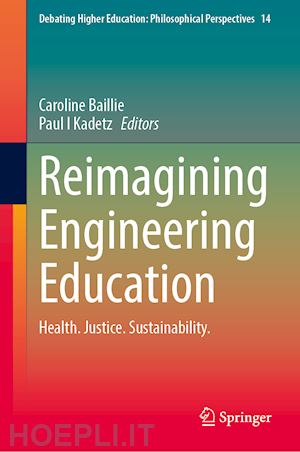
Questo prodotto usufruisce delle SPEDIZIONI GRATIS
selezionando l'opzione Corriere Veloce in fase di ordine.
Pagabile anche con Carta della cultura giovani e del merito, 18App Bonus Cultura e Carta del Docente
This book considers a radical change to engineering education. It argues for a reexamination of the traditional way in which engineering students are educated in disciplinary silos and how, instead, we might re-imagine their professional education to more appropriately prepare students to design innovative solutions to increasingly complex global challenges. It poses the question: “How can engineers think outside the engineers’ box?". A box that has over generations rendered engineers to be unquestioning servants of the socio-political systems in which they function.
The book introduces a unique framework and language for engineering education which considers both the problems of the past and present, and the potential solutions offered for the future. By reaching out beyond the bounds of traditional knowledge and thought collectives, this book will also offer a pathway for other professional education programs to explore.
Chapter 1. Introduction to the Book (Caroline Baillie and Paul Kadetz).- Part I: Engineering and Transdisciplinarity.- Chapter 2. The Order of Knowledge: Disciplinarity, Transdisciplinarity, and Beyond (Paul Kadetz).- Chapter 3. Transdisciplinary Design Thinking and Learning from Nature (Chris Rose).- Part II: Engineering for Health, Justice and Sustainability.- Chapter 4. ‘Wholing’ Health (Paul Kadetz).- Chapter 5. Unpacking Sustainability: The Case of Agriculture (Paul Kadetz).- Chapter 6. Empowering Sustainable Communities: Integrating Environmentally and Socially Conscious Engineering Education for Effective Waste Resource (Prasadi H L Arachchige and Randika Jayasinghe).- Part III: Transformations in Thinking.- Chapter 7. Just Transitions in Engineering Education (Shehla Arif).- Chapter 8. Prior Thanksgiving: The Challenge to Engineering of the Words That Come Before All Else (Chris Beeman).- Chapter 9. An Engineering Filled with Gratitude for All Living Things (George Catalano).- Part IV: Knowledge Sharing in Praxis.- Chapter 10. Engineering Exchanges: Knowledge Sharing for Social Justice (Camilo Andrés Navarro Forero).- Chapter 11. Engineering Exchanges: Community-based Engineering in London, UK (Sarah Bell, Charlotte Johnson, Kat Austen, Gemma Moore and Tse-Hui The).- Chapter 12. Engineering Education for Social Enterprise: The Case of Post-Conflict Rwanda (Gilbert Karareba and Caroline Baillie).- Chapter 13. Transdisciplinary Learning in Practice: MESH (Caroline Baillie, Mahtaub Golab, Leon Santen and Lilian Maruti Wanjala).- Chapter 14. Epilogue: Transforming Consciousness by Rediscovering Whole Thinking (Paul Kadetz and Caroline Baillie).- Index.
Caroline Baillie is Professor in Integrated Engineering at the University of San Diego, and co-founding director of MESH (MS in Engineering, Sustainability and Health (with Paul Kadetz). She is also co-founding director of the not-for-profit ‘Waste for Life’ (wasteforlife.org), which supports vulnerable communities in the development of upcycled, waste-based businesses.
Paul I. Kadetz is a Senior Lecturer (Associate Professor) in the Institute for Global Health and Development at Queen Margaret University, UK and a Professor of Practice in the Shiley-Marcos School of Engineering at University of San Diego. He is the co-founding director of the Master's degree program in Engineering, Sustainability and Health (MESH) with Caroline Baillie. His research and scholarship works across the areas of global health, critical medical anthropology, and international development. He has designed and directed programs in global health in the Netherlands, China, the UK, and the United States. In addition to over 100 book chapters, peer reviewed journal and conference papers, his publications include The Handbook of Welfare in China (Elgar, 2017); Creating Katrina, Rebuilding Resilience (Elsevier, 2018); and the forthcoming Encyclopedia of Health Humanities (Springer, 2024).











Il sito utilizza cookie ed altri strumenti di tracciamento che raccolgono informazioni dal dispositivo dell’utente. Oltre ai cookie tecnici ed analitici aggregati, strettamente necessari per il funzionamento di questo sito web, previo consenso dell’utente possono essere installati cookie di profilazione e marketing e cookie dei social media. Cliccando su “Accetto tutti i cookie” saranno attivate tutte le categorie di cookie. Per accettare solo deterninate categorie di cookie, cliccare invece su “Impostazioni cookie”. Chiudendo il banner o continuando a navigare saranno installati solo cookie tecnici. Per maggiori dettagli, consultare la Cookie Policy.